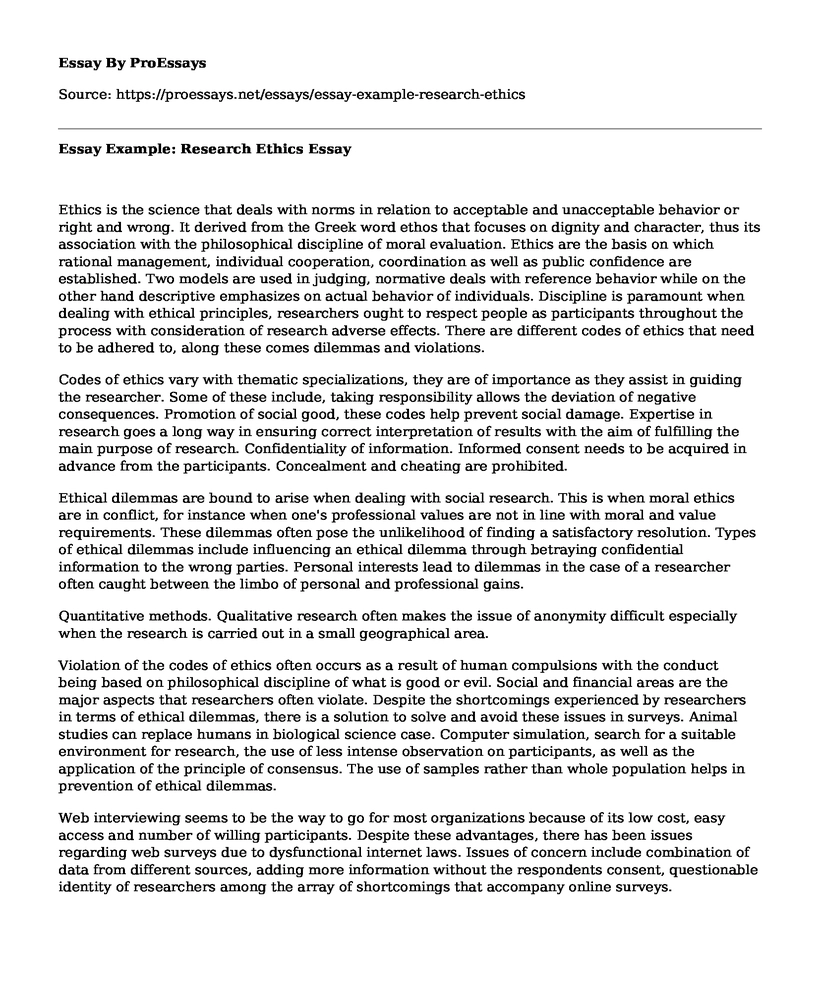Ethics is the science that deals with norms in relation to acceptable and unacceptable behavior or right and wrong. It derived from the Greek word ethos that focuses on dignity and character, thus its association with the philosophical discipline of moral evaluation. Ethics are the basis on which rational management, individual cooperation, coordination as well as public confidence are established. Two models are used in judging, normative deals with reference behavior while on the other hand descriptive emphasizes on actual behavior of individuals. Discipline is paramount when dealing with ethical principles, researchers ought to respect people as participants throughout the process with consideration of research adverse effects. There are different codes of ethics that need to be adhered to, along these comes dilemmas and violations.
Codes of ethics vary with thematic specializations, they are of importance as they assist in guiding the researcher. Some of these include, taking responsibility allows the deviation of negative consequences. Promotion of social good, these codes help prevent social damage. Expertise in research goes a long way in ensuring correct interpretation of results with the aim of fulfilling the main purpose of research. Confidentiality of information. Informed consent needs to be acquired in advance from the participants. Concealment and cheating are prohibited.
Ethical dilemmas are bound to arise when dealing with social research. This is when moral ethics are in conflict, for instance when one's professional values are not in line with moral and value requirements. These dilemmas often pose the unlikelihood of finding a satisfactory resolution. Types of ethical dilemmas include influencing an ethical dilemma through betraying confidential information to the wrong parties. Personal interests lead to dilemmas in the case of a researcher often caught between the limbo of personal and professional gains.
Quantitative methods. Qualitative research often makes the issue of anonymity difficult especially when the research is carried out in a small geographical area.
Violation of the codes of ethics often occurs as a result of human compulsions with the conduct being based on philosophical discipline of what is good or evil. Social and financial areas are the major aspects that researchers often violate. Despite the shortcomings experienced by researchers in terms of ethical dilemmas, there is a solution to solve and avoid these issues in surveys. Animal studies can replace humans in biological science case. Computer simulation, search for a suitable environment for research, the use of less intense observation on participants, as well as the application of the principle of consensus. The use of samples rather than whole population helps in prevention of ethical dilemmas.
Web interviewing seems to be the way to go for most organizations because of its low cost, easy access and number of willing participants. Despite these advantages, there has been issues regarding web surveys due to dysfunctional internet laws. Issues of concern include combination of data from different sources, adding more information without the respondents consent, questionable identity of researchers among the array of shortcomings that accompany online surveys.
Cite this page
Essay Example: Research Ethics. (2021, Apr 01). Retrieved from https://proessays.net/essays/essay-example-research-ethics
If you are the original author of this essay and no longer wish to have it published on the ProEssays website, please click below to request its removal:
- Essay Sample on Community Prevention Program
- Principles of Ethical Issues Essay Example
- Essay Example on Social Construction: Understanding Meaning in Society
- Essay Example on Noise: The Barrier to Effective Communication
- Exposure to TV Portraying Interpersonal Conflicts and Controlling in Romantic Relationships: Essay Sample
- Essay on Women Pivotal in Civil War: Volunteering, Nursing, Advocating, Spying, and More
- Free Essay Sample on Marketing Performance







